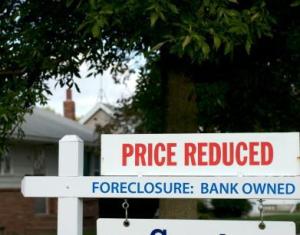 Up till now, I’ve been a flipper of high-end properties. That may change given the upheavals in our economy and it’s possible I may move into the foreclosure market. These properties are also called “bank owned property” or “REO” for “real estate owned”. You’ve probably been hearing a lot about “short sales” too, but that’s something different and I’ll get into that in a separate posting.
Up till now, I’ve been a flipper of high-end properties. That may change given the upheavals in our economy and it’s possible I may move into the foreclosure market. These properties are also called “bank owned property” or “REO” for “real estate owned”. You’ve probably been hearing a lot about “short sales” too, but that’s something different and I’ll get into that in a separate posting.
In the interest of full disclosure, I have not yet bought a foreclosed property but it’s not for lack of trying. I’ve been shut out of six offers in recent months because I didn’t know the nuances of the game. Here’s what I’ve since learned:
Banks are dispassionate
When buying from an owner, there is lots of emotion that guides the strategy of the offer and the subsequent negotiations. When buying from a bank, the property is just a number on a very long list and the bank has no emotional ties to the house whatsoever. Your offer is reviewed by a bank employee who is following strict policies and procedures. Your offer either falls within their acceptable parameters and the deal kicks into gear, or it doesn’t and your offer is ignored. There’s no negotiation so any efforts to try to outsmart the bank are wasted.
Understand how the price was determined
Banks are overwhelmed with properties and it’s getting worse by the day. They do not have the wherewithal to inspect each property or the money to spend $400 or more for a proper appraisal on each and every one. Instead, they often outsource to a real estate broker for what’s called a “BPO” – a Broker’s Pricing Opinion. This broker may or may not visit the property – they may establish the price merely by doing some quick desk research and going by gut feel. (As a former appraiser, I can tell you they also called me for an opinion.) Since the property is one in a very large portfolio, nobody cares enough to re-think or second-guess the BPO. I know from having worked with real estate agents and brokers, they will do everything they can to prop up the prices so they will generally come in high – higher than a certified appraiser would. Even though the banks know this, they’d still rather start on the high side than leave money on the table, so the high estimate is accepted.
Know when the price starts to move downward
I made a lowball offer on a foreclosed house while it was within 30 days on market and my offer was ignored. About 90 days later, it sold for much less than my offer. What happened? I was aggressive too soon. When a foreclosed house is first listed, the bank will be the least flexible on the price. Once the listing hits 30 to 60 days on market, the bank may start accepting offers that are within 10-15% of the asking price. At 90 days, they may lower the price and accept offers within a wider margin. So pay attention to how many days the house has been listed by watching the “Days On Market” or “DOM” on the MLS listing. And be sure to check the listing price daily – if it drops, it’s time to make your move.
Know your market to spot the bargains
Frequent readers of JetSetRnv8r know that my Golden Rule is to buy where you know – know the prices, know the buyers, know the trends, etc. If you’re an expert on the area, you’ll know if the price on a new listing is high, reasonable or low. In their rush to get the house listed, the bank may have accepted a BPO which is too low and that should set-off alarm bells in your head.
If at first you don’t succeed, try, try again
If the bank doesn’t respond to your first offer within a week at most, don’t wait, they are not going to respond. Like I said earlier, they do not negotiate so no response is a clear “no thanks”. Raise your offer a few points and repeat every four to five days until you have a deal.
Look for more postings to follow as I wade deeper into the foreclosure pool. And I invite my readers to contribute their experiences in this burgeoning new market.